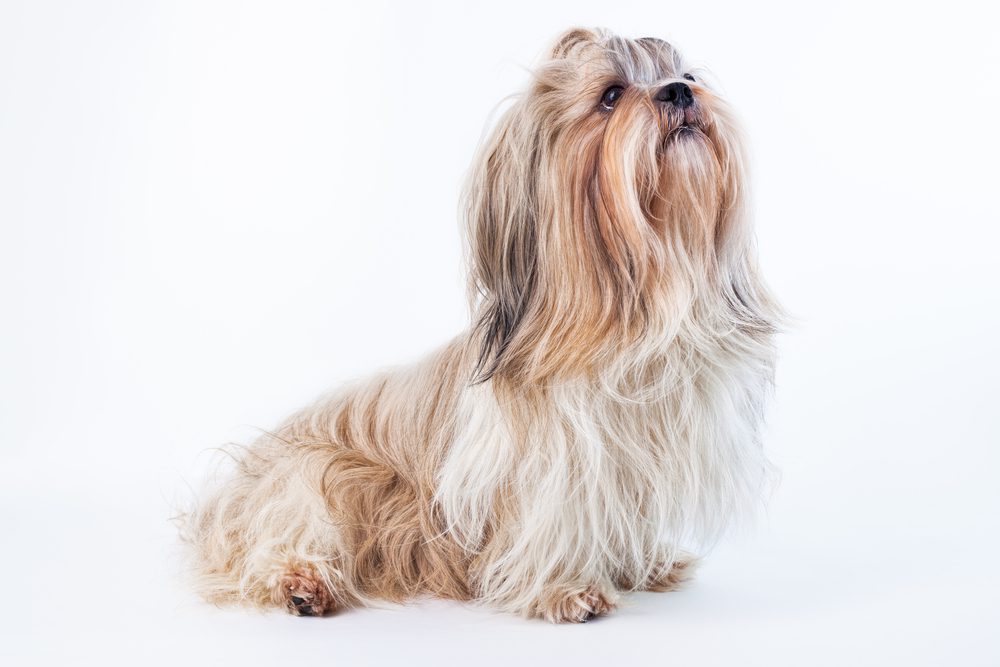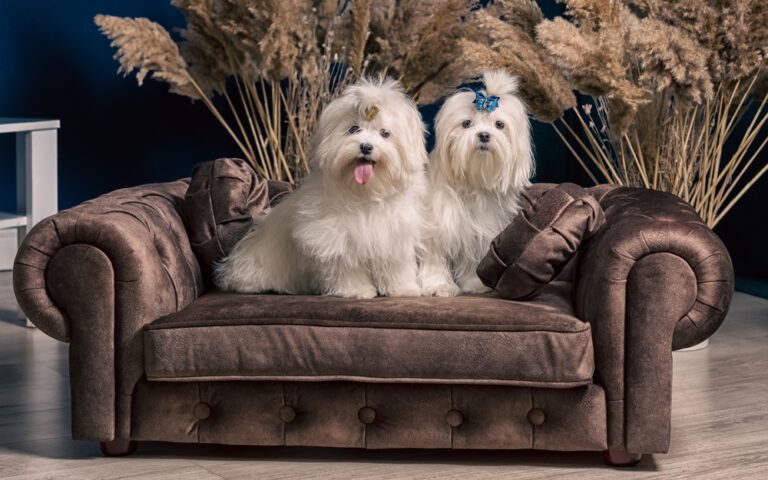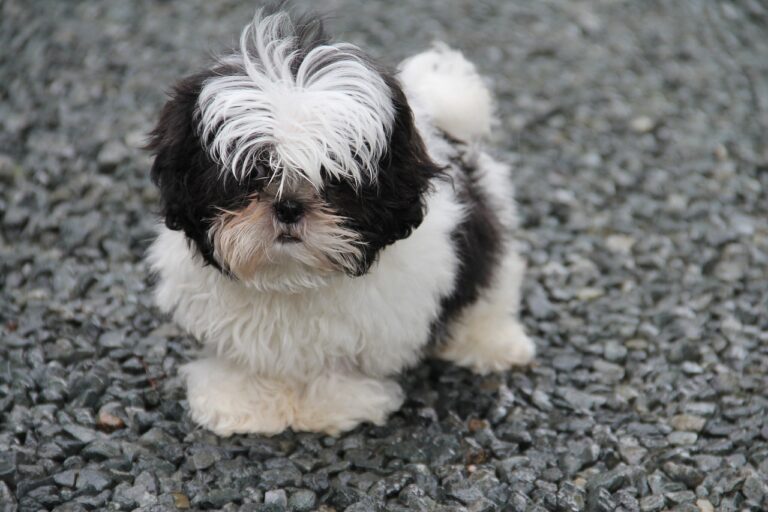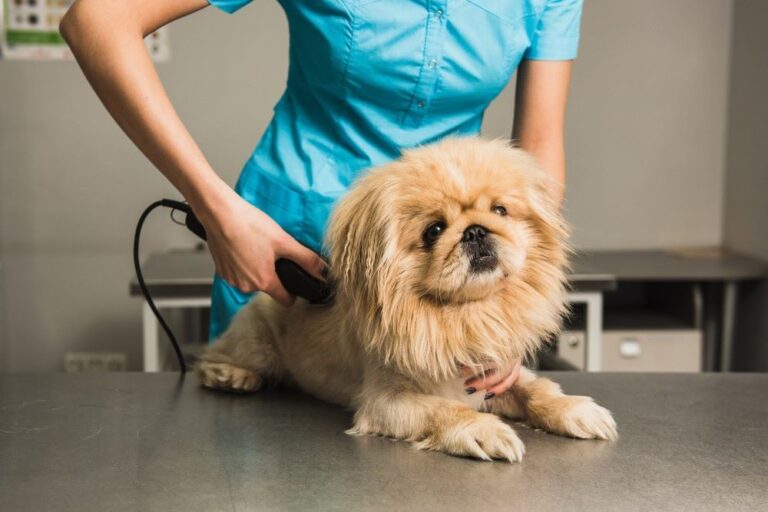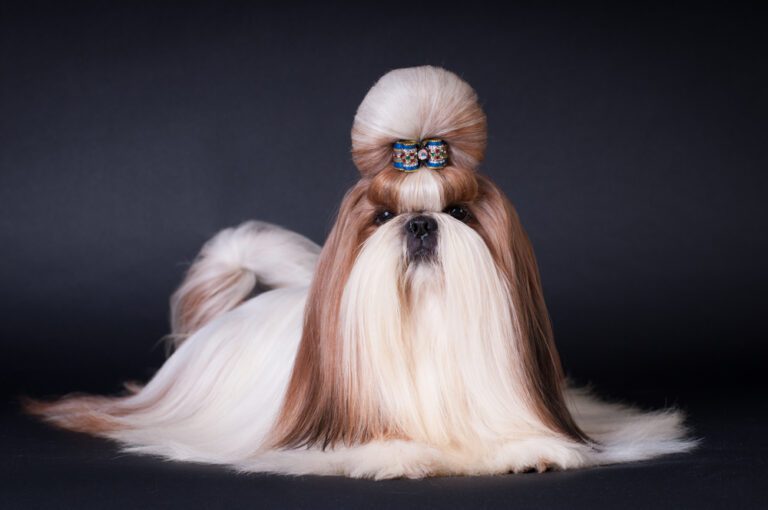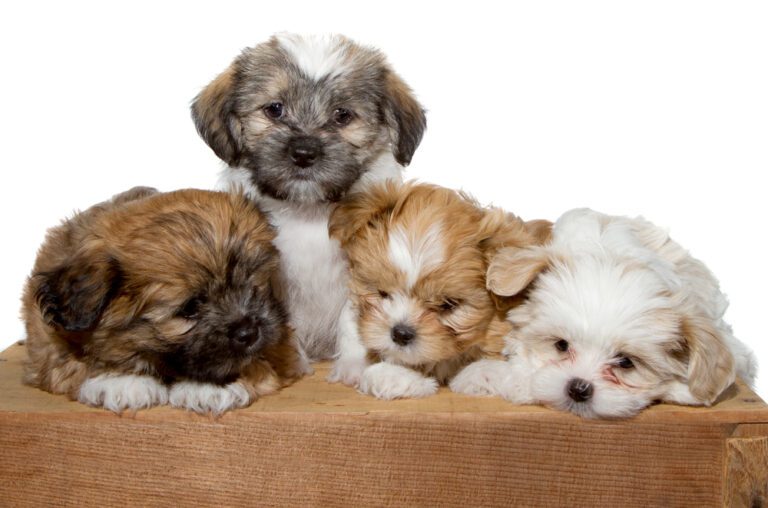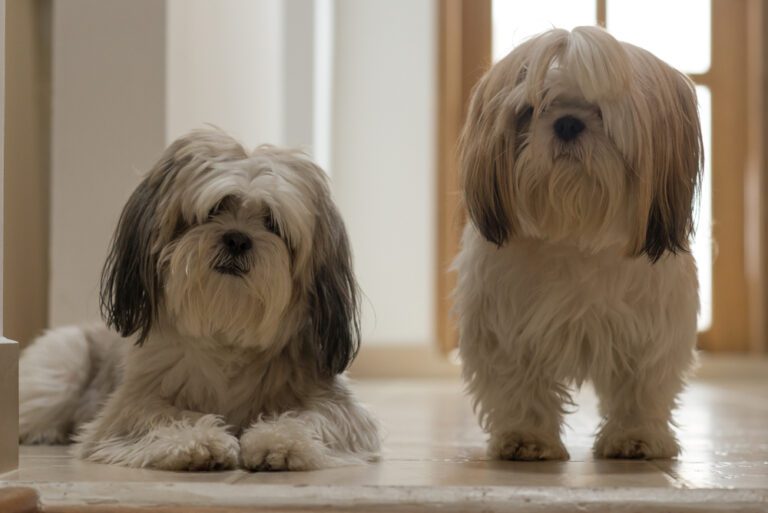Top 10 Reasons Why Shih Tzu Lose Hair
The Top 10 Reasons Why Shih Tzu Lose Hair? The bond between a Shih Tzu and its owner is marked by unconditional love and companionship. As devoted pet owners, we are attuned to our furry friends’ well-being; nothing can be more problematic than noticing our Shih Tzu experiencing hair loss. A lush and vibrant coat is an aesthetic pleasure and a sign of a healthy and happy canine companion.
This comprehensive guide delves into the intricacies of Shih Tzu hair loss, exploring the top 10 reasons behind this phenomenon. Whether you are a seasoned Shih Tzu owner or a newcomer to the world of canine companionship, understanding the factors contributing to hair loss is crucial for maintaining your pet’s overall health and well-being.
From common causes to lesser-known culprits, we unravel the mysteries of Shih Tzu hair loss. Join us as we explore each facet, providing insights and solutions for pet owners who want the best for their beloved Shih Tzus.
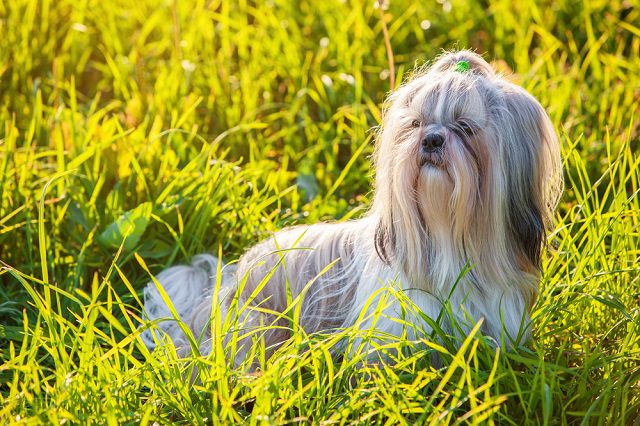
Understanding the common causes of hair loss in Shih Tzu
To effectively address the predicament of Shih Tzu hair loss, navigating the spectrum of common causes underlying this enigmatic issue is imperative. Our four-legged companions, though resilient, can face many challenges that manifest in hair loss. Let’s explore the primary factors contributing to this phenomenon, ensuring pet owners know how to safeguard their Shih Tzus’ health.
1. Genetic Predisposition
One of the foremost factors influencing Shih Tzu hair loss is their genetic predisposition. Certain hereditary conditions and lineage-specific traits can contribute to a Shih Tzu’s susceptibility to hair-related issues. Understanding the genetic background of your pet can shed light on potential vulnerabilities and guide proactive measures to mitigate the impact.
2. Nutritional Deficiencies
The adage “you are what you eat” resonates strongly in the context of Shih Tzu health. Inadequate nutrition, including essential vitamin and mineral deficiencies, can manifest as hair loss. A balanced and wholesome diet tailored to meet the specific nutritional needs of Shih Tzus is paramount in promoting a healthy coat.
3. Skin Infections and Parasites
Shih Tzus, like any other breed, are susceptible to skin infections and parasites that can compromise the integrity of their coat. Fungal infections, mites, and fleas are common culprits. Regular grooming and veterinary check-ups can aid in early detection and prompt treatment, preventing these issues from exacerbating and causing hair loss.
4. Allergies
Allergic reactions to certain foods, environmental factors, or grooming products can trigger hair loss in Shih Tzus. Identifying and eliminating allergens from their surroundings can alleviate symptoms and promote a healthier coat.
5. Hormonal Imbalances
Hormonal fluctuations, often associated with age or underlying health conditions, can contribute to Shih Tzu hair loss. Disorders such as hypothyroidism or Cushing’s disease may manifest in changes to the coat. Timely veterinary intervention and hormone level assessments can aid in diagnosis and management.
6. Stress and Anxiety:
Shih Tzus are sensitive beings, and stress or anxiety can manifest physically, including in the form of hair loss. Changes in environment, routine, or the introduction of new family members can trigger stress. Providing a secure and comforting environment is essential in mitigating these effects.
Understanding these common causes sets the stage for a proactive and informed approach to managing and preventing hair loss in Shih Tzus. In the subsequent sections of this guide, we delve deeper into each of these factors, offering insights and practical strategies to promote a luxuriant coat and optimal well-being for your cherished pet.
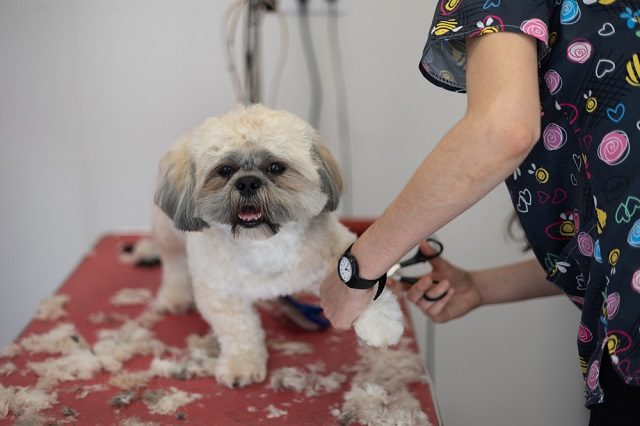
Poor grooming habits leading to hair loss
Grooming is not merely a cosmetic ritual for Shih Tzus but a fundamental aspect of their overall health and well-being. Unfortunately, inadequate grooming practices can significantly contribute to hair loss in these charming canine companions. Let’s explore how poor grooming habits can impact the luscious coats for which Shih Tzus is known.
1. Matting and Tangling
Shih Tzus boasts a luxurious double coat that requires regular attention to prevent matting and tangling. When left unattended, these mats become uncomfortable for the dog and create a breeding ground for skin infections. Constantly pulling and tugging during grooming sessions to address neglected mats can lead to hair breakage and loss.
2. Inadequate Brushing
Brushing is more than a cosmetic nicety; it is a crucial practice to remove loose hair, distribute natural oils, and stimulate the skin. Failure to brush a Shih Tzu regularly can result in a build-up of loose hair, causing discomfort for the dog and excessive shedding.
3. Improper Bathing Techniques
Bathing is a delicate balance for Shih Tzus, and improper techniques can contribute to hair loss. Using harsh shampoos, infrequent bathing, or inadequate rinsing can irritate the skin and compromise the health of the coat. Understanding the specific needs of Shih Tzu grooming, including suitable shampoos and proper drying, is paramount in maintaining a healthy coat.
4. Overuse of Grooming Products
While grooming products are essential, their overuse can have adverse effects. Excessive application of styling products or harsh chemicals can strip the coat of its natural oils, leading to dryness and brittleness. Choosing grooming products tailored to the Shih Tzu’s unique requirements is vital to preserving the integrity of the coat.
5. Neglecting Ear and Paw Hair
Shih Tzus are prone to excessive hair growth in their ears and paw pads. Neglecting these areas can lead to discomfort, infections, and subsequent hair loss. Regular trimming and cleaning of these regions are essential to a comprehensive grooming routine.
By cultivating a mindful and consistent grooming regimen, Shih Tzu owners can actively contribute to the well-being of their pets and prevent unnecessary hair loss. In the subsequent sections, we’ll explore effective grooming practices and tips to ensure your Shih Tzu’s coat remains a testament to their health and happiness.
Nutritional deficiencies and its impact on Shih Tzu’s coat
The saying “you are what you eat” extends beyond human nutrition to our beloved Shih Tzus. The quality of their diet plays a pivotal role in their overall health and the condition of their coat. This section delves into the profound impact of nutritional deficiencies on Shih Tzu’s luxurious and vibrant coat.
1. Essential Vitamins and Minerals
A well-balanced diet for a Shih Tzu should include a spectrum of essential vitamins and minerals. Deficiencies in key nutrients such as Vitamin A, Vitamin E, biotin, and omega-3 fatty acids can directly affect the health of the coat. These elements produce healthy skin cells and maintain a glossy, well-nourished coat.
2. Protein Deficiency
Protein is a cornerstone of any canine diet, and Shih Tzus, in particular, require an adequate amount for the health of their coat. Insufficient protein intake can weaken hair shafts, increasing shedding and a lackluster coat. High-quality protein sources, such as lean meats and fish, promote optimal coat health.
3. Hydration and Coat Moisture
Proper hydration is often underestimated in its impact on coat health. Dehydration can lead to dry and brittle hair, making it more prone to breakage and shedding. Ensuring that your Shih Tzu has access to clean, fresh water is a simple yet vital aspect of maintaining a hydrated and glossy coat.
4. Balanced Omega-6 and Omega-3 Fatty Acids
Balancing omega-6 and omega-3 fatty acids is crucial for skin and coat health. An imbalance can contribute to inflammation and dryness. Including sources of omega-3 fatty acids, such as fish oil, in your Shih Tzu’s diet can help maintain a supple and resilient coat.
5. Tailored Shih Tzu Diets
Shih Tzus have unique dietary requirements, and a one-size-fits-all approach may not suffice. Opting for commercial dog foods formulated explicitly for Shih Tzus or consulting with a veterinarian to create a customized diet plan ensures that their nutritional needs, including those crucial for coat health, are met.
Recognizing and addressing nutritional deficiencies is a proactive step toward preserving the beauty of your Shih Tzu’s coat. In the subsequent sections, we will explore dietary guidelines, recommended supplements, and practical tips to enhance the nutritional profile of your Shih Tzu’s diet, promoting a radiant and resilient coat.
Allergies: A significant contributor to hair loss in Shih Tzu
While the Shih Tzu’s adorable appearance and affectionate nature capture our hearts, these delightful companions are not immune to the challenges posed by allergies. Allergic reactions can manifest in various ways, with one of the notable effects being hair loss. This section explores the intricate relationship between allergies and the loss of the Shih Tzu’s luscious coat.
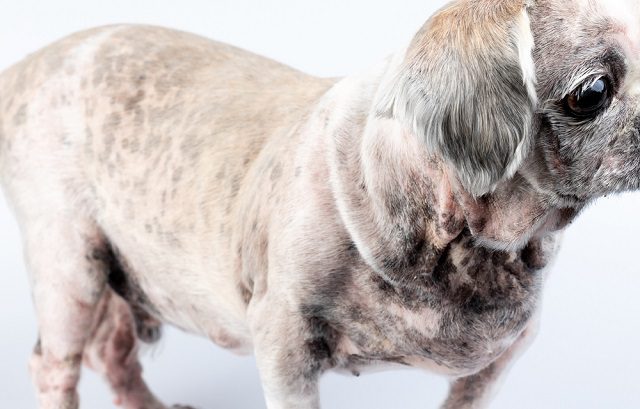
1. Food Allergies
Like many other breeds, Shih Tzus can develop sensitivities or allergies to certain ingredients in their diet. Common culprits include grains, proteins, and additives. When a Shih Tzu is allergic to specific food components, it can trigger skin reactions, leading to itching, inflammation, and hair loss. Identifying and eliminating the allergenic elements from their diet is crucial in preventing further coat-related issues.
2. Environmental Allergens
The world is rife with environmental allergens that can adversely affect a Shih Tzu’s coat. Pollen, dust mites, mold, and certain plants are potential triggers. When exposed to these allergens, Shih Tzus may exhibit allergic reactions such as itching, redness, and hair loss. Minimizing exposure to these allergens and keeping the living environment clean can alleviate allergic responses and help maintain a healthy coat.
3. Contact Allergies
Shih Tzus can also develop allergies through direct contact with certain substances. This includes grooming products, fabrics, or household cleaners. If a Shih Tzu exhibits signs of irritation or hair loss after contact with a particular substance, it is essential to identify and eliminate the allergen from their environment.
4. Seasonal Allergies
Just like humans, Shih Tzus can experience seasonal allergies triggered by changes in weather or environmental factors. Pollen levels, grass, and outdoor allergens can contribute to skin reactions and hair loss. Monitoring your Shih Tzu’s behavior and consulting with a veterinarian can help manage seasonal allergies effectively.
5. Allergic Dermatitis
Allergic dermatitis, an inflammatory skin condition resulting from allergies, is a common cause of hair loss in Shih Tzus. It often manifests as redness, itching, and discomfort. Identifying the specific allergen-causing dermatitis and implementing strategies to reduce exposure is vital for preserving the integrity of the coat.
6. Hormonal Imbalances
Hormonal imbalances can profoundly influence the health of a Shih Tzu’s coat. Often linked to underlying health conditions, these imbalances can manifest as hair loss, leaving pet owners understandably concerned. In this section, we explore the intricate relationship between hormonal fluctuations and the integrity of a Shih Tzu’s luxurious coat.
7. Hypothyroidism
Hypothyroidism, a condition where the thyroid gland doesn’t produce enough thyroid hormone, is a recognized hormonal disorder in dogs, including Shih Tzus. Insufficient thyroid hormones can lead to changes in the coat, including dryness, brittleness, and hair loss. Identifying and managing hypothyroidism under veterinary guidance is crucial in restoring coat health.
8. Cushing’s Disease
Cushing’s disease, or hyperadrenocorticism, results from excessive cortisol production. This hormonal imbalance can lead to various symptoms, including changes in coat quality. Shih Tzus with Cushing’s disease may experience coat thinning, hyperpigmentation, and increased infection susceptibility. Diagnosis and treatment under the care of a veterinarian are essential for addressing these hormonal imbalances.
9. Reproductive Hormone Changes
Female Shih Tzus may undergo hormonal changes related to their reproductive cycle, pregnancy, or lactation. These changes can influence coat quality, sometimes leading to temporary hair loss. Understanding the natural fluctuations in reproductive hormones and providing appropriate care during these phases is essential for maintaining a healthy coat.
10. Adrenal Gland Disorders
Disorders affecting the adrenal glands, such as Addison’s disease, can disrupt the delicate balance of hormones in a Shih Tzu’s body. Adrenal gland dysfunction can impact the coat, causing texture changes and hair loss. Veterinary consultation is imperative for accurate diagnosis and effective management.
11. Puberty and Aging
Hormonal changes associated with puberty and aging can also affect a Shih Tzu’s coat. While puberty may bring a thicker and more adult-like coat, aging can lead to changes such as greying or thinning. Monitoring these natural processes and adapting grooming and care routines can support coat health throughout a Shih Tzu’s life.
Understanding the nuances of hormonal imbalances enables pet owners to recognize potential issues early on. In the subsequent sections, we will delve into strategies for hormonal health maintenance, including regular veterinary check-ups, hormone level assessments, and lifestyle adjustments, ensuring your Shih Tzu’s coat remains a testament to their overall well-being.
Stress and anxiety: Unraveling the connection to hair loss
With their affectionate demeanor and loyal disposition, Shih Tzus may appear resilient, but like any living being, they can be susceptible to stress and anxiety. The impact of these emotional states extends beyond behavioral changes, often leaving an imprint on the health of their coat. This section explores the intricate connection between stress, anxiety, and hair loss in Shih Tzus.
1. Sensitive Nature of Shih Tzus
Shih Tzus are renowned for their sensitivity to the emotional atmosphere of their surroundings. Changes in routine, household dynamics, or exposure to new environments can induce stress in these perceptive companions. Stressors such as loud noises, unfamiliar visitors, or abrupt changes in the household can trigger anxiety responses.
2. Physical Manifestations of Stress
While stress and anxiety are primarily considered emotional states, they can manifest physically in Shih Tzus. One common manifestation is the development of stress-related dermatitis, characterized by itching, redness, and hair loss. The connection between emotional well-being and coat health underscores the importance of a harmonious and stress-free environment.
3. Behavioral Indicators
Shih Tzus communicate their emotional states through behavior. Excessive scratching, licking, or chewing on their fur can indicate stress-induced grooming behaviors. These actions can lead to localized or generalized hair loss if left unchecked.
4. Life Changes and Transitions
Shih Tzus can be particularly affected by significant life changes, such as moving to a new home, introducing a new family member (human or pet), or lacking a familiar companion. These transitions can induce stress, resulting in behavioral changes that may impact the health of their coat.
5. Separation Anxiety
Being devoted to their human companions, Shih Tzus may experience separation anxiety when left alone for extended periods. This emotional distress can manifest in various ways, including destructive behavior and excessive grooming, potentially leading to hair loss.
6. Managing Stress for Coat Health
Recognizing and addressing stressors is paramount for maintaining a Shih Tzu’s coat health. Providing a stable and predictable environment, incorporating positive reinforcement training, and ensuring regular exercise can all contribute to reducing stress and anxiety levels. Additionally, the introduction of interactive toys or comforting items may help alleviate anxiety during periods of solitude.
Understanding the connection between stress, anxiety, and hair loss empowers pet owners to create an environment conducive to their Shih Tzu’s emotional well-being. The following sections explore practical strategies and lifestyle adjustments to minimize stressors, ensuring a flourishing coat and a contented Shih Tzu.
Medical conditions that can cause hair loss in Shih Tzu
While a Shih Tzu coat is often a source of pride for pet owners, its health can be influenced by various medical conditions. Understanding the potential impact of these conditions is essential in addressing hair loss in Shih Tzus. In this section, we explore various medical factors that can contribute to the loss of their signature luxurious coat.
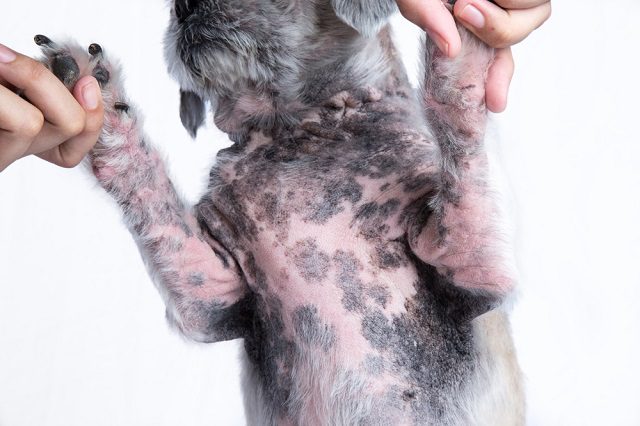
1. Ringworm Infections
Regardless its name, ringworm is not caused by a worm but by a fungal infection. Shih Tzus can be susceptible to ringworm, leading to circular patches of hair loss, redness, and itching. Identifying and treating ringworm promptly is crucial to prevent its spread and minimize the impact on the coat.
2. Folliculitis
Folliculitis, an inflammation of the hair follicles, can result from bacterial or fungal infections. Shih Tzus may develop folliculitis, leading to pimples, redness, and subsequent hair loss. Addressing the underlying infection and providing appropriate veterinary care is essential for resolving this condition.
3. Autoimmune Disorders
Certain autoimmune disorders can impact the coat by mistakenly causing the immune system to attack hair follicles. Alopecia, or hair loss, may occur in patches or more widespread areas. Diagnosing and managing autoimmune conditions under the guidance of a veterinarian is crucial for maintaining the health of the coat.
4. Hormonal Disorders
In addition to hormonal imbalances discussed earlier, specific hormonal disorders can contribute to hair loss in Shih Tzus. Conditions such as hyperthyroidism or adrenal gland disorders can disrupt the normal growth cycle of the coat. Timely diagnosis and treatment are essential to address these underlying hormonal issues.
5. Cancer
Unfortunately, cancer can also be a factor contributing to hair loss in Shih Tzus. Skin tumors or cancers affecting the coat-producing cells can result in localized or widespread hair loss. Early detection through regular veterinary check-ups is crucial for addressing potential cancer-related hair loss.
6. Allergic Dermatitis
While discussed in the context of allergies, allergic dermatitis, when chronic, can be considered a medical condition. Prolonged exposure to allergens can lead to persistent inflammation, itching, and hair loss. Identifying and managing the specific allergen and veterinary guidance is essential for preventing ongoing coat issues.
7. Infections and Infestations
Various infections, both bacterial and fungal, as well as external parasites like fleas and mites, can impact a Shih Tzu’s coat. These conditions can cause irritation, itching, and subsequent hair loss. Regular grooming, preventive measures, and prompt treatment of infections are vital for coat health.
Understanding the diverse medical conditions that can contribute to hair loss empowers pet owners to seek timely veterinary intervention. In the subsequent sections, we will delve into specific diagnostic approaches, treatment options, and preventative measures to ensure a Shih Tzu’s coat remains resilient and vibrant.
Environmental factors affecting your Shih Tzu’s coat health
The environment in which a Shih Tzu lives plays a significant role in the health and vitality of its coat. From climate conditions to the quality of the living space, various environmental factors can impact the luscious coat that Shih Tzus is known for. In this section, we explore how the surroundings and external elements can affect the coat health of your beloved companion.
1. Humidity and Dryness
The humidity level in the environment directly influences the moisture content in a Shih Tzu’s coat. Low humidity can lead to dryness, making the coat more prone to breakage and split ends. Conversely, high humidity can contribute to matting and tangling. Maintaining a balanced environment, especially during dry or humid seasons, is essential for preserving coat health.
2. Sun Exposure
While essential for overall well-being, sunlight can positively and negatively affect a Shih Tzu’s coat. Prolonged exposure to direct sunlight can lead to sunburn, dryness, and fading of coat color. Providing shade and limiting sun exposure, especially during peak hours, helps protect the coat from potential damage.
3. Wind and Outdoor Elements
Windy conditions and exposure to outdoor elements can result in debris, dust, and pollutants accumulating in a Shih Tzu’s coat. Regular grooming and, when necessary, protective clothing can prevent these external elements from causing irritation and potential hair loss.
4. Indoor Air Quality
The quality of the indoor environment, including air circulation and cleanliness, can impact a Shih Tzu’s coat. Poor indoor air quality may contribute to allergies or skin irritations, leading to scratching and hair loss. Ensuring proper ventilation and cleanliness in indoor spaces is vital for maintaining a healthy coat.
5. Chemicals and Grooming Products
The choice of grooming products and cleaning agents used in the living space can affect a Shih Tzu’s coat health. Harsh chemicals in cleaning products or grooming substances can strip the coat of its natural oils, leading to dryness and potential hair loss. Opting for pet-friendly and gentle products helps protect the integrity of the coat.
6. Pest Control Measures
While essential for preventing parasites, specific pest control measures can impact a Shih Tzu’s coat health. Overuse or exposure to strong chemicals in flea and tick treatments can cause skin reactions and hair loss. Following recommended guidelines and consulting with a veterinarian ensures effective pest control without compromising coat health.
7. Comfortable Living Conditions
The overall comfort and security of a Shih Tzu’s living space contribute to its emotional well-being, which, in turn, reflects on the coat. A stressed or anxious Shih Tzu may excessively groom, leading to hair loss. Creating a comfortable and stress-free environment promotes emotional health and a flourishing coat.
Understanding and managing these environmental factors are essential for Shih Tzu owners committed to maintaining a vibrant and resilient coat. In the following sections, we will delve into practical tips and strategies for optimizing the living environment to ensure the well-being of your Shih Tzu’s coat.
Tips for preventing hair loss in your Shih Tzu
Preserving the lush and luxurious coat of a Shih Tzu requires proactive care and attention. By incorporating a thoughtful grooming routine, a balanced diet, and a conducive living environment, you can significantly contribute to preventing hair loss in your cherished companion. Here are essential tips to keep your Shih Tzu’s coat healthy and radiant:
1. Regular Grooming
Establish a consistent grooming routine tailored to your Shih Tzu’s specific needs. Regular brushing helps prevent matting, distributes natural oils, and stimulates the skin. Be gentle during grooming sessions to avoid unnecessary stress and hair breakage.
2. Balanced Nutrition
Provide a well-balanced and nutritionally complete diet to meet the specific requirements of Shih Tzus. Ensure adequate intake of essential vitamins, minerals, and high-quality proteins to promote overall health, including the health of the coat.
3. Hydration
Always provide access to clean and fresh water. Proper hydration is crucial for maintaining coat moisture and preventing dryness, which can lead to hair breakage and loss.
4. Choose Suitable Grooming Products
Select grooming products designed explicitly for Shih Tzus. Gentle shampoos and conditioners that suit their unique coat requirements help maintain a healthy and vibrant coat without causing irritation or dryness.
5. Prevent Overexposure to Sunlight
Limit your Shih Tzu’s exposure to direct sunlight, especially during peak hours. When outdoors, provide shade and consider using pet-friendly sunscreen to protect against sunburn and coat damage.
6. Maintain a Clean Living Environment
Ensure a clean and well-ventilated living space for your Shih Tzu. Regularly clean indoor areas to minimize allergens, dust, and pollutants that could irritate the skin and contribute to hair loss.
7. Regular Veterinary Check-ups
Schedule regular check-ups with your veterinarian to monitor your Shih Tzu’s overall health, including the condition of the coat. Early detection of health issues allows for prompt intervention.
8. Address Stress and Anxiety
Minimize stressors in your Shih Tzu’s environment, providing a secure and predictable routine. Address separation anxiety, introduce new elements gradually, and create a comforting atmosphere to reduce stress-related grooming behaviors.
9. Manage Allergies Effectively
If your Shih Tzu has known allergies, work with your veterinarian to identify and manage the specific allergens. Implementing strategies to minimize exposure helps prevent allergic reactions that may lead to hair loss.
10. Exercise and Mental Stimulation
Regular exercise and mental stimulation contribute to a healthy and contented Shih Tzu. Physical activity promotes overall well-being, reducing the likelihood of stress-related coat issues.
11. Avoid Overuse of Grooming Products
Use grooming products in moderation. Excessive use of styling products or harsh chemicals can strip the coat of natural oils, leading to dryness and potential hair loss.
By integrating these tips into your Shih Tzu’s care routine, you can foster a thriving and resilient coat while ensuring your furry friend enjoys optimal health and happiness.
When to seek professional help for your Shih Tzu’s hair loss
While proactive care at home is crucial for your Shih Tzu’s coat health, there are instances when seeking professional help becomes imperative. Recognizing the signs and knowing when to consult a veterinarian or a professional groomer is essential for addressing potential underlying issues contributing to hair loss. Here are key indicators that it’s time to seek professional assistance:
1. Persistent or Worsening Hair Loss
If your Shih Tzu’s hair loss persists or worsens despite your efforts and preventive measures, it’s a clear signal to consult a veterinarian. Chronic or progressive hair loss may indicate an underlying health issue that requires professional diagnosis and treatment.
2. Sudden Onset of Hair Loss
A sudden and unexplained onset of hair loss should raise concerns. Rapid changes in the coat, especially accompanied by redness, inflammation, or other signs of discomfort, warrant prompt veterinary attention to rule out potential health issues.
3. Visible Skin Irritations or Lesions
If you notice visible skin irritations, lesions, or abnormalities accompanying hair loss, it’s crucial to seek professional help. These could indicate skin infections, allergies, or dermatological conditions requiring expert assessment and treatment.
4. Changes in Behavior
Behavioral changes in your Shih Tzu, such as increased scratching, excessive licking, or signs of distress during grooming, may indicate discomfort or pain. Consulting a veterinarian can help identify and address the underlying cause of these changes, including potential contributors to hair loss.
5. Presence of Pests or Parasites
The discovery of fleas, ticks, mites, or other external parasites in your Shih Tzu’s coat requires immediate attention. Professional guidance is essential for effective parasite removal and preventive measures to safeguard your pet’s coat and overall well-being.
6. Lethargy or Changes in Eating Habits
If your Shih Tzu exhibits lethargy, changes in eating habits, or other signs of illness alongside hair loss, it’s a red flag for a potential systemic issue. Consultation with a veterinarian is crucial to assess and address any underlying health concerns.
7. Allergic Reactions
Allergic reactions, including persistent itching, swelling, or hives, necessitate professional evaluation. Identifying the specific allergen and implementing effective management strategies often requires veterinary expertise.
8. Hormonal Imbalances
Signs of hormonal imbalances, such as changes in weight, lethargy, or alterations in behavior, may accompany hair loss. Veterinary assessment and hormone level testing are essential for accurate diagnosis and tailored treatment.
9. Infections and Skin Disorders
Suspected skin infections, disorders, or conditions like ringworm require professional diagnosis and treatment. These issues can contribute significantly to hair loss and may affect your Shih Tzu’s overall health.
10. Excessive Grooming Behaviors
If your Shih Tzu exhibits obsessive grooming behaviors leading to excessive hair loss, it indicates potential stress or anxiety. Professional assistance can help identify and address the underlying emotional factors contributing to such behaviors.
In any of these scenarios, prompt consultation with a veterinarian or a professional groomer is crucial. Early intervention ensures your Shih Tzu’s well-being and increases the likelihood of successful treatment and resolution of hair loss issues.
Conclusion: The Top 10 Reasons Why Shih Tzu Lose Hair?
As a Shih Tzu owner, your role in maintaining their vibrant coat is crucial.
By establishing a consistent grooming routine, providing a balanced diet, and creating a harmonious living space, you actively contribute to your Shih Tzu’s well-being. Regular vet check-ups and professional grooming sessions are essential for early detection and effective management of potential issues.
Your bond with your Shih Tzu goes beyond the physical – it’s built on love and companionship. Being attuned to their needs, responding to their cues, and seeking professional help when necessary are acts of care that enhance their overall happiness.
May your Shih Tzu’s coat always reflect the love and attention you shower upon them. Here’s to many more years of joy and health together!

